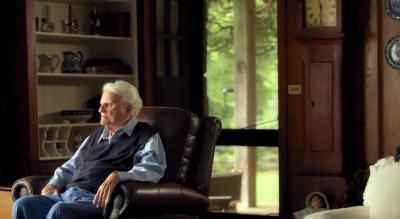Casting the net wide
With two billion users worldwide the internet offers huge scope for reaching people who don’t know Jesus. And the Billy Graham Evangelistic Association is at the forefront of making the Gospel message as accessible as possible
In 1950, when the Billy Graham Evangelistic Association (BGEA) was born, the people writing the mission statement couldn’t possibly have foreseen how computers and the internet would come to dominate our lives. And yet the Mission statement – ‘to take the message of Christ to all we can by every effective means available to us’ – couldn’t be more apt for today’s generation.
Billy Graham, an ordained Baptist minister, may no longer preach to packed out stadiums, but his simple yet powerful presentation of the gospel is perhaps even more accessible now than ever, thanks to the existence of search engines.

“I’ve always been challenged by Jesus saying ‘Go and make disciples’” says Victoria Granger, internet evangelism co-ordinator for Search for Jesus, a UK-based evangelistic organisation of BGEA. “As a team our heart is to go where the people are and many people now live online.”
One of the evangelistic tools Search for Jesus uses is PeacewithGod.org.uk; four short videos that take the viewer through John 3:16. The website doesn’t pretend to be anything other than a direct gospel message, calling people to make a choice. But it does give people the opportunity to ask questions. On the US version of the site people can access an instant chat facility. In the UK, volunteer email responders aim to reply to a searcher’s email with 48 hours.
“Sometimes Christians can shy away from face-to-face evangelism,” says Victoria, “but this gives people time to think about their response.” Victoria says that she and her 22 volunteers have been surprised at the number of questions about forgiveness. Victoria lists a couple of example emails received one morning in April: ‘I can’t forgive myself, how do I know that God will forgive me?’ and ‘I accepted Jesus when I was 12, but I’ve failed in lots of ways how can I know that God will accept me back?’
At the moment, the team are receiving around 13 emails a day. With the anonymity and distance a computer screen provides, people can sit in the comfort of their own homes and ask questions they maybe wouldn’t have the courage to ask in person. Or maybe they don’t know anyone in ‘real life’ who has a faith and can give them the answers they’re looking for. “People are searching spiritually and our site creates a space for people to ask questions,” says Victoria.
One of those asking questions was ‘F’, a Muslim from South Asia. Through email correspondence with a volunteer he became a Christian. His English was a bit limited so the volunteer found a Bible correspondence course in his language. Now ‘F’ is growing in his new-found faith.
Between August 2014 and March 2015, the site received, via a ‘pray now’ button, over 8,000 prayers of commitment. “If people want to become a Christian through the site then we have a discipleship programme and an online discipleship coach,” explains Victoria. “Our hope is that people will want to come out from behind the screen and go to church – we work closely with Deo Gloria Trust (www.deo-gloria.co.uk) and MyHopeUK (a BGEA mission) which have large databases of churches they can be put in touch with.”
People are searching spiritually and our site creates a space for people to ask questions
Peacewithgod.org.uk is perhaps unique because it directs people towards personal interaction. In order for that to work a team of volunteers must be ready behind the scenes, engaging with emailers, dealing with some hard questions, and pointing people to Jesus.
“Volunteers come from a wide church background and vary in age,” says Victoria who takes prospective volunteers through a six-week online training course. “We have some older volunteers, and some stay-at-home mums who have reached a point where they don’t know where to serve in church and this is something they can do from home and that fits around their life.
“We say to our volunteers that before you answer an email remember that you are writing to a human not a computer. Pray that God will help you see them as he does.”
For some Christians, evangelism can be a daunting prospect – how do you strike up a conversation about God, how do you answer your friend’s question about forgiveness? And while internet evangelism may not carry the same risk of embarrassment or rejection as telling a friend or work colleague about Jesus, it certainly provides opportunities for Christians to share the good news of Jesus and witness God at work in people’s lives.
“I felt so elated that I could show people the way to salvation through a personal relationship with the Lord Jesus Christ,” says one volunteer. “Practically, I made notes of people in a private notebook so that I could pray for each one when my laptop was not in use.”

According to Victoria, Billy Graham “really supports the work of internet evangelism and takes an active interest in it.” Not only that but
MyHopeUK, a national initiative to encourage and equip the local Church to proclaim the Gospel, was launched in 2014.
BGEA-produced films, like
“The Cross” (pictured) and a new gospel film to be released this September, include a message from Billy Graham and powerful stories of transformation. These films can be aired in large or small gatherings, in a church or at a friend’s house.
Billy Graham may not be travelling the globe but his words are still having impact on the world stage, not through a microphone in an arena but through tablets, laptops and mobile phones.
The method may be different but the message is the same. And as Billy Graham nears his 97th birthday, he and his organisation remain true to that mission statement “by every effective means available to us.” It’s as relevant today as it was in 1950.
Baptist Times, 01/05/2015